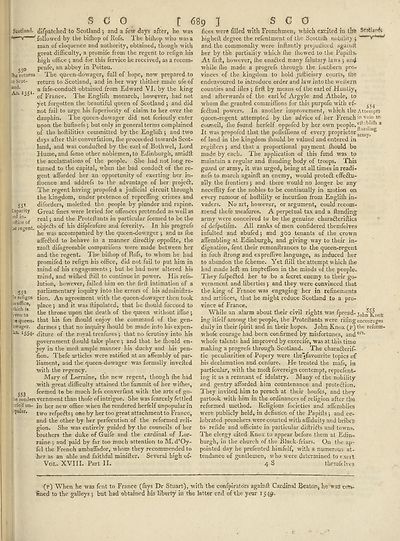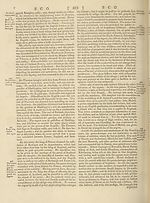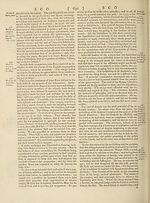Encyclopaedia Britannica, or, a Dictionary of arts, sciences, and miscellaneous literature : enlarged and improved. Illustrated with nearly six hundred engravings > Volume 18, RHI-SCR
(727) Page 689
Download files
Complete book:
Individual page:
Thumbnail gallery: Grid view | List view

SCO
t 689 3
SCO
550
'!he returns
o Srot-
and.
An. 1551.
SS1
Lapacity
:nd in-
aftice of
hi
Scotland, dlfpatclied to Scotland j and a few day's after, he was
“—v ' followed by the bifhop of Ilofs. The bilhop who was a
man of eloquence and authority, obtained, though with
great difficulty, a promife from the regent to refign his
high office ; and for this fervice he received, as a recom-
penfe, an abbey in Poitou.
The queen-dowager, full of hope, now prepared to
return to Scotland, and in her way thither made ufeof
a lafe-condudt obtained from Edward VI. by the king
of France. The Engliffi monarch, however, had not
yet forgotten the beautiful queen of Scotland j and did
not fail to urge his fuperiority of claim to her over the
dauphin. The queen-dowager did not ferioudy enter
upon the bufinefs ; but only in general terms complained
of the hoftilities committed by the Engliffi j and two
days after this converfation, ffie proceeded towards Scot¬
land, and was conduced by the earl of Bothwel, Lord
Hume, and fome other noblemen, to Edinburgh, amidft
the acclamations of the people. She had not long re¬
turned to the capital, when the bad conduct of the re¬
gent afforded her an opportunity of exerting her in¬
fluence and addrefs to the advantage of her project.
The regent having propofed a judicial circuit through
the kingdom, under pretence of reprefling crimes and
diforders, molefted the people by plunder and rapine.
Great fines wrere levied for offences pretended as well as
real; and the Proteflants in particular feemed to be the
regent. °bje.6ts of his difpleafure and feverity. In his progrefs
he was accompanied by the queen-dowager j and as fire
affected to behave in a manner diredtly oppofite, the
moft difagreeable comparifons were made between her
and the regent. The bifhop of Rofs, to whom he had
promifed to refign his office, did not fail to put him in
mind of his engagements •, but he had now altered his
mind, and wiflied ftill to continue in power. His refo-
lution, however, failed him on the firft intimation of a
parliamentary inquiry into the errors of his adminiftra-
tion. An agreement with the queen-dowager then took
place ; and it was flipulated, that he ffiould fucceed to
the throne upon the death of the queen without iffue;
that his fon fhould enjoy the command of the gen¬
darmes ; that no inquiry fhould be made into his expen¬
diture of the royal treafures ; that no ferutiny into his
government fhould take place; and that he fhould en¬
joy in the moft ample manner his duchy and his pen-
fion. Thefe articles were ratified at an affembly of par¬
liament, and the queen-dowager was formally invefted
with the regency.
Mary of Lorraine, the new regent, though ffie had
with great difficulty attained the fummit of her wiffies,
feemed to be much lefs converfant with the arts of go-
leraKlersvernment than thofe of intrigue. She was fcarcely fettled
rfelfun- lier new office when fhe rendered herfelf unpopular in
two refpefts; one by her too great attachment to France,
and the other by her perfecution of the reformed reli¬
gion. She was entirely guided by the councils of her
brothers the duke of Guife and the cardinal of Lor¬
raine ; and paid by far too much attention to M. d’Oy-
fel the French ambaffador, whom they recommended to
her as an able and faithful minifter. Several high of-
Vol. XVIII. Part II.
552
’e refigns
I is office,
i ffiich is
ven to
ne queen-
owager.
in. 1554.
5S3
>pular.
fices were filled with Frenchmen, which excited in the Sestlan&
higheft degree the refentment of the Scottiffi nobility ;
and the commonalty were inftantly prejudiced aganift
her by the partiality which fhe ffiowed to the Papifts.
At firft, however, ffie enacted many falutary laws ; and
while flie made a progrefs through the fouthern pro¬
vinces of the kingdom to hold judiciary courts, the
endeavoured to introduce order and law into the weftern
counties and ifles ; firft by means of the earl of Hunlly,
and afterwards of the earl of Argyle and Athole, to
whom fhe granted commiflions for this purpofe with ef- ^
feflual powers. In another improvement, which the Attempts
queen-regent attempted by the advice of her French •t1 vam to
council, fhe found herfelf oppofed by her own people, a
It was propofed that the poflefliens of every proprietor
of land in the kingdom ffiould be valued and entered in
regifters; and that a proportional payment fhould be
made by each. The application of this fund was to
maintain a regular and Handing body of troops. This
guard or army, it was urged, being at all times in readi-
nefs to march againft: an enemy, would protedl effectu¬
ally the frontiers; and there would no longer be any
neceffity for the nobles to be continually in motion on
every rumour of hoftility or incurfion from Engliffi in¬
vaders. No art, however, or argument, could recom¬
mend thefe meafures. A perpetual tax and a Handing
army were conceived to be the genuine charaCteriftics
of defpotifm. All ranks of men confidered themfelves
infulted and abufed; and 300 tenants of the crown
affembling at Edinburgh, and giving way to their in¬
dignation, fent their remonftrances to the queen-regent
in inch ftrong and expreffive language, as induced her
to abandon the fcheme. Yet ftill the attempt which fhe
had made left an imprefiion in the minds of the people.
They fufpe&ed her to be a fecret enemy to their go¬
vernment and liberties; and they wrere convinced that
the king of France was engaging her in refinements
and artifices, that he might reduce Scotland to a pro¬
vince of France.
While an alarm about their civil rights was fpread- j0]-n Knofe
ing itfelf among the people, the Proteftants were riling encourages
daily in their fpirit and in their hopes. John Knox (p) the reform-
whofe courage had been confirmed by misfortunes, anders*
whofe talents had improved by exercife, was at this time
making a progrefs through Scotland. The charaCterif-
tic peculiarities of Popery were thejfavourite topics of
his declamation and cenfure. He treated the mafs, in
particular, with the moft fovereign contempt, reprefent-
ing it as a remnant of idolatry. Many of the nobility
and gentry afforded him countenance and protection.
They invited him to preach at their houfes, and they
partook with him in the ordinances of religion after tile
reformed method. Religious focieties and affemblies
were publicly held, in defiance of the Papifts; and ce¬
lebrated preachers were courted with affiduity and bribe's
to refide and officiate in particular diitriCts and towns.
The clergy cited Knox to appear before them at Edin¬
burgh, in the church of the Black-friars. On the ap¬
pointed day he prefented himlelf, with a numerous at¬
tendance of gentlemen, who were determined to cxeit
4 S themfelves
(?) When he was fent to France (fays Dr Stuart), with the confpirato’rs againft Cardinal Beatorq he was con¬
fined to the galleys; but had obtained his liberty in the latter end of the year 1549.
t 689 3
SCO
550
'!he returns
o Srot-
and.
An. 1551.
SS1
Lapacity
:nd in-
aftice of
hi
Scotland, dlfpatclied to Scotland j and a few day's after, he was
“—v ' followed by the bifhop of Ilofs. The bilhop who was a
man of eloquence and authority, obtained, though with
great difficulty, a promife from the regent to refign his
high office ; and for this fervice he received, as a recom-
penfe, an abbey in Poitou.
The queen-dowager, full of hope, now prepared to
return to Scotland, and in her way thither made ufeof
a lafe-condudt obtained from Edward VI. by the king
of France. The Engliffi monarch, however, had not
yet forgotten the beautiful queen of Scotland j and did
not fail to urge his fuperiority of claim to her over the
dauphin. The queen-dowager did not ferioudy enter
upon the bufinefs ; but only in general terms complained
of the hoftilities committed by the Engliffi j and two
days after this converfation, ffie proceeded towards Scot¬
land, and was conduced by the earl of Bothwel, Lord
Hume, and fome other noblemen, to Edinburgh, amidft
the acclamations of the people. She had not long re¬
turned to the capital, when the bad conduct of the re¬
gent afforded her an opportunity of exerting her in¬
fluence and addrefs to the advantage of her project.
The regent having propofed a judicial circuit through
the kingdom, under pretence of reprefling crimes and
diforders, molefted the people by plunder and rapine.
Great fines wrere levied for offences pretended as well as
real; and the Proteflants in particular feemed to be the
regent. °bje.6ts of his difpleafure and feverity. In his progrefs
he was accompanied by the queen-dowager j and as fire
affected to behave in a manner diredtly oppofite, the
moft difagreeable comparifons were made between her
and the regent. The bifhop of Rofs, to whom he had
promifed to refign his office, did not fail to put him in
mind of his engagements •, but he had now altered his
mind, and wiflied ftill to continue in power. His refo-
lution, however, failed him on the firft intimation of a
parliamentary inquiry into the errors of his adminiftra-
tion. An agreement with the queen-dowager then took
place ; and it was flipulated, that he ffiould fucceed to
the throne upon the death of the queen without iffue;
that his fon fhould enjoy the command of the gen¬
darmes ; that no inquiry fhould be made into his expen¬
diture of the royal treafures ; that no ferutiny into his
government fhould take place; and that he fhould en¬
joy in the moft ample manner his duchy and his pen-
fion. Thefe articles were ratified at an affembly of par¬
liament, and the queen-dowager was formally invefted
with the regency.
Mary of Lorraine, the new regent, though ffie had
with great difficulty attained the fummit of her wiffies,
feemed to be much lefs converfant with the arts of go-
leraKlersvernment than thofe of intrigue. She was fcarcely fettled
rfelfun- lier new office when fhe rendered herfelf unpopular in
two refpefts; one by her too great attachment to France,
and the other by her perfecution of the reformed reli¬
gion. She was entirely guided by the councils of her
brothers the duke of Guife and the cardinal of Lor¬
raine ; and paid by far too much attention to M. d’Oy-
fel the French ambaffador, whom they recommended to
her as an able and faithful minifter. Several high of-
Vol. XVIII. Part II.
552
’e refigns
I is office,
i ffiich is
ven to
ne queen-
owager.
in. 1554.
5S3
>pular.
fices were filled with Frenchmen, which excited in the Sestlan&
higheft degree the refentment of the Scottiffi nobility ;
and the commonalty were inftantly prejudiced aganift
her by the partiality which fhe ffiowed to the Papifts.
At firft, however, ffie enacted many falutary laws ; and
while flie made a progrefs through the fouthern pro¬
vinces of the kingdom to hold judiciary courts, the
endeavoured to introduce order and law into the weftern
counties and ifles ; firft by means of the earl of Hunlly,
and afterwards of the earl of Argyle and Athole, to
whom fhe granted commiflions for this purpofe with ef- ^
feflual powers. In another improvement, which the Attempts
queen-regent attempted by the advice of her French •t1 vam to
council, fhe found herfelf oppofed by her own people, a
It was propofed that the poflefliens of every proprietor
of land in the kingdom ffiould be valued and entered in
regifters; and that a proportional payment fhould be
made by each. The application of this fund was to
maintain a regular and Handing body of troops. This
guard or army, it was urged, being at all times in readi-
nefs to march againft: an enemy, would protedl effectu¬
ally the frontiers; and there would no longer be any
neceffity for the nobles to be continually in motion on
every rumour of hoftility or incurfion from Engliffi in¬
vaders. No art, however, or argument, could recom¬
mend thefe meafures. A perpetual tax and a Handing
army were conceived to be the genuine charaCteriftics
of defpotifm. All ranks of men confidered themfelves
infulted and abufed; and 300 tenants of the crown
affembling at Edinburgh, and giving way to their in¬
dignation, fent their remonftrances to the queen-regent
in inch ftrong and expreffive language, as induced her
to abandon the fcheme. Yet ftill the attempt which fhe
had made left an imprefiion in the minds of the people.
They fufpe&ed her to be a fecret enemy to their go¬
vernment and liberties; and they wrere convinced that
the king of France was engaging her in refinements
and artifices, that he might reduce Scotland to a pro¬
vince of France.
While an alarm about their civil rights was fpread- j0]-n Knofe
ing itfelf among the people, the Proteftants were riling encourages
daily in their fpirit and in their hopes. John Knox (p) the reform-
whofe courage had been confirmed by misfortunes, anders*
whofe talents had improved by exercife, was at this time
making a progrefs through Scotland. The charaCterif-
tic peculiarities of Popery were thejfavourite topics of
his declamation and cenfure. He treated the mafs, in
particular, with the moft fovereign contempt, reprefent-
ing it as a remnant of idolatry. Many of the nobility
and gentry afforded him countenance and protection.
They invited him to preach at their houfes, and they
partook with him in the ordinances of religion after tile
reformed method. Religious focieties and affemblies
were publicly held, in defiance of the Papifts; and ce¬
lebrated preachers were courted with affiduity and bribe's
to refide and officiate in particular diitriCts and towns.
The clergy cited Knox to appear before them at Edin¬
burgh, in the church of the Black-friars. On the ap¬
pointed day he prefented himlelf, with a numerous at¬
tendance of gentlemen, who were determined to cxeit
4 S themfelves
(?) When he was fent to France (fays Dr Stuart), with the confpirato’rs againft Cardinal Beatorq he was con¬
fined to the galleys; but had obtained his liberty in the latter end of the year 1549.
Set display mode to:
![]() Universal Viewer |
Universal Viewer | ![]() Mirador |
Large image | Transcription
Mirador |
Large image | Transcription
Images and transcriptions on this page, including medium image downloads, may be used under the Creative Commons Attribution 4.0 International Licence unless otherwise stated. ![]()
| Permanent URL | https://digital.nls.uk/193028158 |
|---|
| Attribution and copyright: |
|
|---|
| Description | Ten editions of 'Encyclopaedia Britannica', issued from 1768-1903, in 231 volumes. Originally issued in 100 weekly parts (3 volumes) between 1768 and 1771 by publishers: Colin Macfarquhar and Andrew Bell (Edinburgh); editor: William Smellie: engraver: Andrew Bell. Expanded editions in the 19th century featured more volumes and contributions from leading experts in their fields. Managed and published in Edinburgh up to the 9th edition (25 volumes, from 1875-1889); the 10th edition (1902-1903) re-issued the 9th edition, with 11 supplementary volumes. |
|---|---|
| Additional NLS resources: |
|

